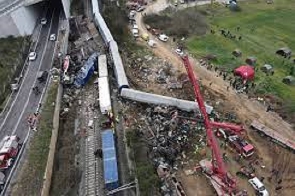On the evening of February 28, 2023, a horrific train accident happened in Greece, resulting in the deaths of 43 individuals and the injuries of many others. There was a head-on accident between a passenger train carrying around 350 people and a freight train. Human error was subsequently determined to be the cause of the tragedy, and the incident prompted a national mourning period and doubts about the efficacy of railway safety standards.
Incident description
The crash occurred at 11 p.m. local time near the city of Larissa in central Greece. The passenger train was traveling from Athens to Thessaloniki, with the majority of its passengers being students returning to school after visiting relatives in the capital city. In the meantime, the freight train was transporting merchandise in the opposite way. The high-speed collision between the two trains resulted in the catastrophic derailment of the passenger train.
According to eyewitness accounts, the first four passenger railcars derailed, with the first two catching fire. The survivors revealed their traumatic experiences of being trapped inside the burning carriages. Many were forced to leave by any means necessary, including shattering windows with suitcases. The crash was the greatest train disaster in Greece in recent memory, and the rescue operation comprised over 150 individuals searching for survivors throughout the night.
Possible causes of failure
An investigation into the accident revealed that human error was the cause of the collision. Specifically, it was determined that the station master at Larissa, who was responsible for coordinating the passage of trains in the region, had made a major error. Instead of telling the passenger train to wait at a specified passing point for the freight train, the station master provided permission for both trains to approach each other on the same track.
With the enormous speed at which both trains were going, the crash was especially catastrophic. According to reports, both trains were traveling at around 140 kilometers per hour, and the accident caused substantial damage to the passenger train. This tragedy calls into question the sufficiency of railway safety procedures in Greece and demonstrates the necessity for tougher restrictions to prevent future incidents of this nature.
Evidence of Failure: The examination following the incident indicated that a number of crucial errors led to fatal consequences. The most serious was the station master's failure to adhere to customary protocols for coordinating train movements. Rather than instructing the passenger train to wait at a specified passing location, he permitted both trains to approach each other on the same track. This miscalculation led to the fatal collision that took the lives of 43 people.
The high rate of speed at which both trains were traveling further contributed to the severity of the accident. The force of the collision at 140 kilometers per hour was substantial, causing major damage to the passenger train. Surviving passengers describe a sight of utter misery, with flames and smoke engulfing the derailed wagons.
Lessons learned
The terrible train crash in Greece emphasizes the vital need of adhering to standard safety measures and regulations in railway operations. The catastrophic outcome caused by the station master's inability to follow established protocols demonstrates the need for strict attention to safety measures to prevent similar mishaps in the future.
The tragedy also highlights the necessity for increasing investment in railway safety measures, such as the use of modern technology and infrastructure upgrades. This includes the adoption of automatic train control systems and speed restrictions in high-risk locations.
The Greek train accident emphasizes the significance of emergency preparedness and reaction. The rescuers who painstakingly searched for survivors throughout the night exemplified the crucial role of emergency response workers in reducing the effects of disasters.
The train crash in Greece is a tragedy that could have been averted if adequate safety precautions had been in place. The occurrence serves as a reminder of the necessity of transportation safety measures, and the inquiry should focus on determining the underlying cause of the accident in order to prevent similar incidents in the future. Our thoughts and prayers are with the victims' families, and we wish those injured in the tragedy a fast recovery.
Opinions of Tuesday, 7 March 2023
Columnist: Thompson Emmanuel Anu















